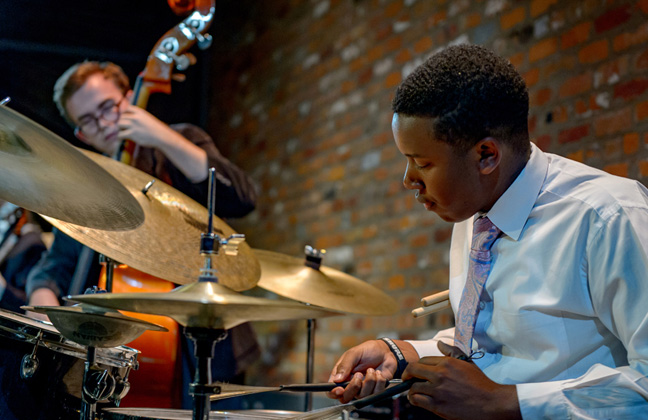
Students currently in 8th-11th grades may apply for High School Arts Instruction.
The Jazz Instrumental Music Department is designed to create not only a proficient Jazz performer, but a well-educated and literate musician. Students are taught scales, chords, and fundamental stylistic elements of various periods of Jazz through specific repertoire of Jazz literature. Students are expected to memorize a minimum of four songs with solo transcriptions each semester and perform these works in a combo setting in class and the weekly student performance class. Students will also perform these requirements at the Jazz juries at the end of each semester. Also, students are taught via books, handouts, master recordings, performance videos, and various guest artist master classes about the great Jazz artists and their significant contributions to Jazz history. Students also learn about the masterworks of Classical music and study comparisons in the various styles.
It is strongly recommended that all students first attend the NOCCA Jazz Audition Information Session before attempting the official NOCCA Jazz audition.
Students should take INDIVIDUAL OR GROUP MUSIC LESSONS OR PARTICIPATE IN AN ORGANIZED MUSIC PROGRAM for at least ONE FULL YEAR with a QUALIFIED Jazz instructor to have the necessary skills required to pass the NOCCA audition.
At the audition:
Students who audition for NOCCA are expected to be able to do ALL of the following:
-
-
Play the melody and improvise with the blues scale over a basic 12-bar blues form. Pianists and guitarists should know some basic Jazz chord voicings. Students may choose one of following blues tunes or another similar blues tune: St. Louis Blues (F Blues) Tenor Madness (Bb) Blue Monk (Bb), Second Line (Bb Blues) Sonny Moon for Two (Bb Blues) Now's the Time (F Blues) etc. Students may prepare a more advanced Jazz tune if they wish, but at the very least they must be able to improvise over the basic 12-bar blues form. 2. Play and spell the major, mixolydian (7th tone lowered a 1/2 step), and dorian scales (3rd and 7th tones lowered a 1/2 step) EVENLY and ACCURATELY with PROPER FINGERINGS in keys up to 3 flats and 3 sharps (C, F, Bb, Eb, G, D, A).
-
Play ARPEGGIOS for major 7th (1-3-5-7-5-3-1), dominant 7th (1-3-5-b7-5-3-1), and minor 7th chords (1-b3-5- b7-5-b3-1) EVENLY and ACCURATELY with PROPER FINGERINGS in keys up to 3 sharps and 3 flats (C, F, Bb, Eb, G, D, A).
-
Have solid knowledge of key signatures (up to 3 flats and 3 sharps), music theory, and basic intervals (minor 2nd, major 2nd, minor 3rd, major 3rd, perfect 4th etc.) for keys up to 3 sharps and 3 flats (C, F, Bb, Eb, G, D, A., and notes in BOTH clefs.
-
Sight-read a simple melody accurately with correct rhythm and intonation. (All students, all instruments.) Guitar Tab reading is NOT accepted.
-
Sight-read and play basic rhythm patterns accurately (basic 8th note and simple 16th note patterns, including basic time signatures).
-
Match pitches and short melodic patterns by ear (from the piano) and play them back on your instrument accurately and relatively quickly.
-
Drummers are responsible for all the above requirements and will be asked to play scales and find notes on the piano by ear. It is strongly recommended that drummers have some experience playing the piano or some other melodic instrument. All students at NOCCA study music theory and drummers must be able to fulfill these requirements at the same level as every other student. Drummers who cannot fulfill these minimum requirements at the audition will not be admitted into the program.
Jazz Instrumental Scale Exercise
Jazz Instrumental Theory Study Guide
In addition to individual department requirements, all applicants will:
-
- Upload to the application a 1-2 minute video of the applicant answering the question, “Why do I want to train at NOCCA?"
- Upload to the application a copy of the most recent report card. Applicants must have at least a 2.0 GPA.
- Be prepared with the email of an adult who is not related to you to complete your recommendation. Your recommender will receive an email from Acceptd with a link to fill out a recommendation form online.
Faculty

Dr. Leslie Cain
Music Theory, Ear Training, Accompanist MusicBiography
Pianist Leslie Cain, D.M.A., has been widely praised for her delicate touch and nuanced sense of color at the keyboard. Born and raised in Los Angeles, she completed her Bachelor’s degree at the Manhattan School of Music, where she studied with André-Michel Schub. She subsequently earned her Master’s and Doctoral degrees from the University of California, Santa Barbara in the studio of Paul Berkowitz. Prior to attending conservatory, she completed an undergraduate degree in Philosophy from California State University, Los Angeles, where she was named the department’s Outstanding Undergraduate in her junior year.
Dr. Cain’s primary interest as a pianist and scholar is the French repertoire of the early 20th century, especially Maurice Ravel, Claude Debussy, and Erik Satie. Her doctoral dissertation, “Ravel the Existentialist?,” reconciles the two disciplines of her academic background by analyzing the composer’s life and work using the philosophy of Jean-Paul Sartre as a conceptual and historical lens. She is also an alumna of the Conservatoire Américain de Fontainebleau, the renowned institute of French music held each summer at Napoleon Bonaparte’s château.
Dr. Cain has performed in master classes with many of the world’s foremost musicians, including Murray Perahia, Jeremy Denk, Gilbert Kalish, Yo-Yo Ma and the Kronos Quartet. She was one of six pianists selected to perform in Richard Goode’s master class on the Debussy preludes at Carnegie Hall, by invitation of the Weill Music Institute. Her other recognitions include first prizes in the Los Angeles International Liszt Competition, the MTNA Senior Piano Competition, and the Cypress College Piano Competition, as well as concerto performances with several orchestras throughout Southern California. During her doctoral studies, she was a member of UC Santa Barbara’s fellowship ensemble, the Young Artist Piano Quartet, and especially enjoys collaborating with string players as a chamber musician.
Besides playing and teaching music, a few of Dr. Cain’s favorite things include her tortoiseshell cat Ouija, lavender lattes, the New Orleans Spooky Book Club, and, when assuming her not-so-secret identity as a fitness instructor, teaching classes for Barre3.
http://www.leslieedithcain.com
